人教版英语八年级下册重点语法复习与练习
人教版英语八年级下册单元知识点总结及同步练习 Unit3--4单元(无答案)
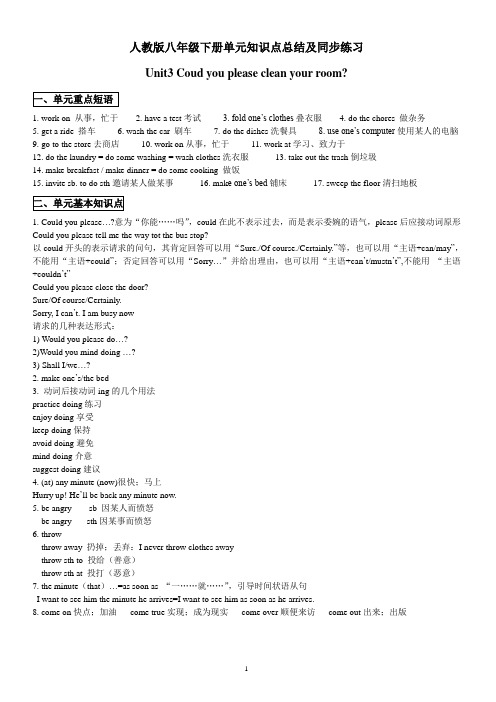
人教版八年级下册单元知识点总结及同步练习Unit3 Coud you please clean your room?1. work on 从事,忙于2. have a test考试3. fold one’s clothes叠衣服4. do the chores 做杂务5. get a ride 搭车6. wash the car 刷车7. do the dishes洗餐具8. use one’s computer使用某人的电脑9. go to the store去商店10. work on从事,忙于11. work at学习、致力于12. do the laundry = do some washing = wash clothes洗衣服13. take out the trash倒垃圾14. make breakfast / make dinner = do some cooking 做饭15. invite sb. to do sth邀请某人做某事16. mak e one’s bed铺床17. sweep the floor清扫地板1. Could you please…?意为“你能……吗”,could在此不表示过去,而是表示委婉的语气,please后应接动词原形Could you please tell me the way tot the bus stop?以could开头的表示请求的问句,其肯定回答可以用“Sure./Of course./Certainly.”等,也可以用“主语+can/may”,不能用“主语+could”;否定回答可以用“Sorry…”并给出理由,也可以用“主语+can’t/mustn’t”,不能用“主语+couldn’t”Could you please close the door?Sure/Of course/Certainly.Sorry, I can’t. I am busy now请求的几种表达形式:1) Would you please do…?2)Would you mind doing …?3) Shall I/we…?2. make one’s/the bed_________________3. 动词后接动词ing的几个用法practice doing练习enjoy doing享受keep doing保持avoid doing避免mind doing介意suggest doing建议4. (at) any minute (now)很快;马上Hurry up! He’ll be back any minute now.5. be angry ___ sb 因某人而愤怒be angry ___sth因某事而愤怒6. throwthrow away 扔掉;丢弃:I never throw clothes awaythrow sth to 投给(善意)throw sth at 投打(恶意)7. the minute(that)…=as soon as “一……就……”,引导时间状语从句I want to see him the minute he arrives=I want to see him as soon as he arrives.8. come on快点;加油come true实现;成为现实come over顺便来访come out出来;出版9. reply to sb/sth对某人/某物做出回答或反应10. all the time频繁;反复, 常常位于句末,强调在某段时间内一直进行或发生某事I have a dog and a cat, but they fight all the time.11. as…as…像……一样……表示两者在某方面程度相同,第一个as是副词,后应该跟形容词或副词的原级,第二个as是介词,后可跟名词,代词拓展:as…as…的否定形式是not as/so…as…“不如……;不与……一样”He studies as hard as his bother.He doesn’t study as/so hard as his brother12. neither1)neither did I 是“neither+be动词/助动词/情态动词+主语”结构,表示前者的否定情况也适用于后者。
人教版八年级下册英语英语语法知识点精讲+练习
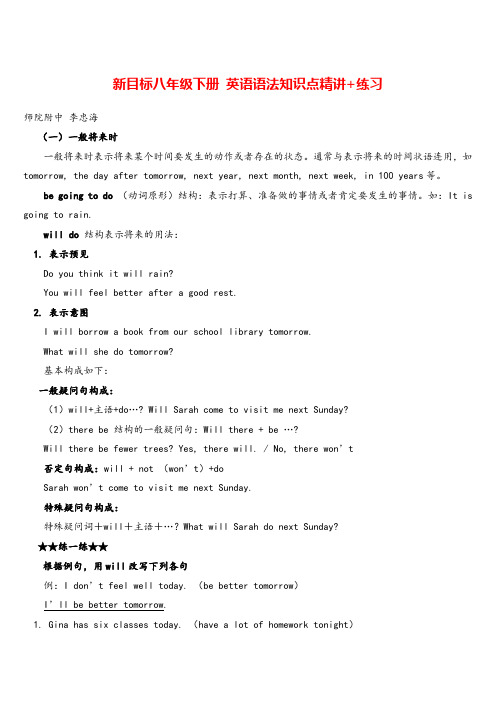
新目标八年级下册英语语法知识点精讲+练习师院附中李忠海(一)一般将来时一般将来时表示将来某个时间要发生的动作或者存在的状态。
通常与表示将来的时间状语连用,如tomorrow, the day after tomorrow, next year, next month, next week, in 100 years等。
be going to do(动词原形)结构:表示打算、准备做的事情或者肯定要发生的事情。
如:It is going to rain.will do结构表示将来的用法:1. 表示预见Do you think it will rain?You will feel better after a good rest.2. 表示意图I will borrow a book from our school library tomorrow.What will she do tomorrow?基本构成如下:一般疑问句构成:(1)will+主语+do…? Will Sarah come to visit me next Sunday?(2)there be 结构的一般疑问句:Will there + be …?Will there be fewer trees? Yes, there will. / No, there won’t否定句构成:will + not (won’t)+doSarah won’t come to visit me next Sunday.特殊疑问句构成:特殊疑问词+will+主语+…?What will Sarah do next Sunday?★★练一练★★根据例句,用will改写下列各句例:I don’t feel well today. (be better tomorrow)I’ll be better tomorrow.1. Gina has six classes today. (have a lot of homework tonight)_____________________________2. I’m tired now. (sleep later)_____________________________3. My parents need a new car. (buy one soon)_____________________________4. We can’t leave right now. (leave a little later)____________________________5. The weather is awful today. (be better tomorrow)_____________________________答案:1. She’ll have a lot of homework tonight.2. I’ll sleep later.3. They’ll buy onesoon.4. We’ll leave a little later.5. Maybe it’llbe better tomorrow.(二)should的用法:should用来提出建议和忠告,后边加动词原形,否定句直接在should后边加not.例如:I think you should eat less junk food.我认为你应该少垃圾食品。
八年级下册人教版英语Unit 9 重点语法及练习题
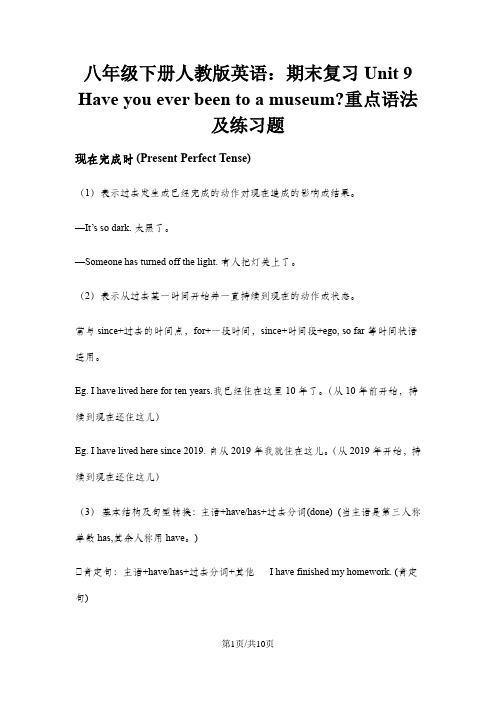
八年级下册人教版英语:期末复习Unit 9 Have you ever been to a museum?重点语法及练习题现在完成时(Present Perfect Tense)(1)表示过去发生或已经完成的动作对现在造成的影响或结果。
—It’s so dark.太黑了。
—Someone has turned off the light.有人把灯关上了。
(2)表示从过去某一时间开始并一直持续到现在的动作或状态。
常与since+过去的时间点,for+一段时间,since+时间段+ego,so far等时间状语连用。
Eg.I have lived here for ten years.我已经住在这里10年了。
(从10年前开始,持续到现在还住这儿)Eg.I have lived here since2019.自从2019年我就住在这儿。
(从2019年开始,持续到现在还住这儿)(3)基本结构及句型转换:主语+have/has+过去分词(done)(当主语是第三人称单数has,其余人称用have。
)①肯定句:主语+have/has+过去分词+其他I have finished my homework.(肯定句)①否定句:主语+have/has+not+过去分词+其他I have not finished my homework.(否定句)①一般疑问句:Have/Has+主语+过去分词+其他—Have you finished your homework?—Yes,I have./No,I haven’t,(一般疑问句及肯定、否定回答)(4)has gone(to),has been(to),has been(in)的区别Have/Has gone(to):去了(现在不在说话现场)Eg. ---Where is your father?---He has gone to Shanghai.Have/Has been(to):去过(已不在去过的地方)Eg.My father has been to Shanghai.Have/has been in:呆了多久(还在所呆的地方)Eg.My father has been in Shanghai for two months.=My father has been in Shangha i since two months ago.(5)现在完成时的标志:①常与just,already,yet,ever,never,before,so far等连用,强调动作的完成,不强调动作的持续。
人教版八年级英语下册单元语法归纳及练习全套

人教版八年级英语下册单元语法归纳及练习全套Unit 1 重点语法教学目标:掌握情态动词should的用法掌握反身代词的用法1.情态动词should的用法( 1 ) 情态动词should后接动词原形,变为一般疑问句时将should提前,变为否定句时在should后面加not。
We should listen to our teacher carefully in class.Should I tell him the news right now?We shouldn’t come late to school.( 2 ) should常用于以下两种情况:①提出建议、观点或看法。
You look tired. You should lie down and rest.②表示推测,意为“该,按理应当”。
Wait a minute. I think he should come in a moment.2.反身代词( 1 ) 反身代词的构成反身代词是表示或强调自身的代词,有人称和数之分。
第一、二人称反身代词由“形容词性物主代词+ self ( 单数)或selves ( 复数)”构成;第三人称则由“宾格人称代词+ self ( 单数)或selves ( 复数) ”构成。
详见下表:( 2 ) 反身代词的用法①做宾语You must look after yourself well and keep healthy.The child can dress himself.②做同位语He didn’t often go shopping himself.= He himself didn’t often go shopping.③做主语在现代英语中,反身代词一般不能独立用作主语,但是它可以借助and, or, nor等连词与其他名词一起构成并列主语(且位于并列主语的后部),以及用于某些特殊结构(如as...as 等)。
2023-2024学年八年级英语下册单元重难点易错题精练人教版Unit 2重点语法附解析
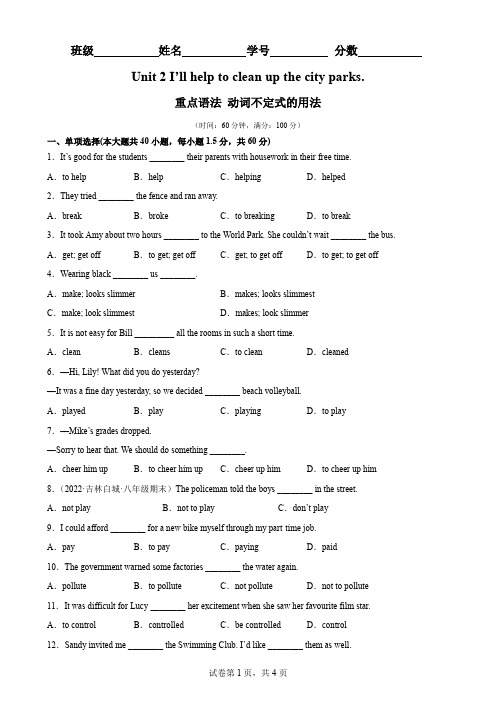
班级姓名学号分数Unit 2 I’ll help to clean up the city parks.重点语法动词不定式的用法(时间:60分钟,满分:100分)一、单项选择(本大题共40小题,每小题1.5分,共60分)1.It’s good for the students ________ their parents with housework in their free time.A.to help B.help C.helping D.helped2.They tried ________ the fence and ran away.A.break B.broke C.to breaking D.to break3.It took Amy about two hours ________ to the World Park. She couldn’t wait ________ the bus. A.get; get off B.to get; get off C.get; to get off D.to get; to get off 4.Wearing black ________ us ________.A.make; looks slimmer B.makes; looks slimmestC.make; look slimmest D.makes; look slimmer5.It is not easy for Bill _________ all the rooms in such a short time.A.clean B.cleans C.to clean D.cleaned6.—Hi, Lily! What did you do yesterday?—It was a fine day yesterday, so we decided ________ beach volleyball.A.played B.play C.playing D.to play 7.—Mike’s grades dropped.—Sorry to hear that. We should do something ________.A.cheer him up B.to cheer him up C.cheer up him D.to cheer up him 8.(2022·吉林白城·八年级期末)The policeman told the boys ________ in the street.A.not play B.not to play C.don’t play9.I could afford ________ for a new bike myself through my part-time job.A.pay B.to pay C.paying D.paid10.The government warned some factories ________ the water again.A.pollute B.to pollute C.not pollute D.not to pollute 11.It was difficult for Lucy ________ her excitement when she saw her favourite film star. A.to control B.controlled C.be controlled D.control 12.Sandy invited me ________ the Swimming Club. I’d like ________ them as well.试卷第1页,共4页A.to join in; to join in B.to join; to join inC.to join in; to join D.to join; to join13.What a heavy rain! The boys decided not ________ climbing.A.go B.going C.to go14.—Mum, can I have something ________ ?—Oh dear. You can only drink some water. There is ________ in the fridge.A.to drink ; nothing else B.to eat ; something elseC.drinking ; something else D.eating ; nothing else15.Mr. Smith expects ________ a job as a teacher in China.A.to find B.find C.finding D.found16.In the end, the police tried ________ the real criminal and put the result in newspapers. A.found B.finding C.to find out D.finding out 17.His mother often makes him ________ homework.A.to do B.doing C.does D.do18.Time seems ________ when we are playing computer games.A.to go faster B.going faster C.to going faster D.goes fastest 19.— I’m planning ________ the weekend with my grandparents.—Oh, don’t ________ to buy them some nice food.A.to spend; forget B.to spend; remember C.spending; forget D.spending; remember 20.Parents always ask us ________.A.to keep health B.keeping healthy C.to keep healthy D.keeping health 21.Mary often saw the boys ________ on the playground during the summer holiday.A.to run B.running C.run D.ran22.He likes to tell funny stories to make people ________.A.of laugh B.to laugh C.laughing D.laugh 23.Because of COVID-19 in February, the government advised us ________ to the public places. A.to go B.going C.not to go D.go24.I wanted to see the Beiing Opera, so Lingling offered ________ me there.A.take B.takes C.taking D.to take25.My parents allow me ________ the Internet for half an hour every weekend.A.surf B.surfs C.surfing D.to surf26.Lisa seemed ________ excited because her parents planned to take her to Sanya for vacation.试卷第2页,共4页A.getting B.to get C.got D.get27.If you want ________ what is happening around the world, watch the news every day. A.know B.known C.to know D.knowing 28.We hope _________ well so that we have more fans to watch the matches.A.play B.to play C.playing D.played 29.The teacher told us ________ English every day.A.read B.reading C.reads D.to read 30.Please stop ________ a rest if you feel tired.A.to have B.having C.have D.has 31.Jack’s sister likes playing the violin very much. Her dream is ___________ a musician. A.to be B.to being C.be D.being 32.—Would you like ________ coffee?—No, thanks. I’d like ________ some milk.A.some; drinking B.any; to drink C.any; drinking D.some; to drink 33.The teacher will give us a talk on how ________ English well.A.learn B.learnt C.to learn D.learning 34.Let’s ________ noise. Someone is sleeping.A.not make B.not to making C.not to make D.not making 35.Will you choose ________ in the front of the bus ________ in the back?A.to sit; and B.sitting; but C.sit; or D.to sit; or 36.________ improve my English, I would like to find a penfriend in England.A.In order that B.In order to C.Thanks for D.Thanks to 37.—What a surprise! I didn’t expect ________ you here.—Yeah. I just came back from Shanghai.A.see B.seeing C.to see D.to seeing 38.Dear passengers, don’t forget ________ your things when you get off the bus.A.to take B.take C.to taking D.taking 39.The mother told her son ________ the water dirty.A.don’t make B.not make C.to not make D.not to make 40.I often watch Bob ________ in the lake. He must be interested in swimming.A.to swim B.swam C.to swimming D.swim试卷第3页,共4页二、用所给单词的正确形式填空(本大题共20小题,每小题2分,共40分) 41.Ask your sister ___________ the piano when you are not studying. (play) 42.Mr. Lee’s smiling eyes make us ________ (feel) warm.43.We warn students ________ (not swim) in the river every summer. It’s dangerous. 44.My parents encourage me ________ (make) my own decisions.45.Girls seem ________ (learn) English better than boys.46.All of us want to know how ________ (play) computer games.47.Tom told me _________(not touch)anything in the science museum.48.Our teacher advised us ________ (not make) the same mistakes in the tests.49.It took us two hours to decide how ________ (spend) the coming vacation.50.All of us were quite surprised ________ (meet) the famous star in the shopping center. 51.How we wish ________ (visit) the Palace Museum!52.I’ve got no idea about how ________(stay) alive in the wild.53.It’s dangerous ________ (use) a lift during a fire.54.My mum often advises me ________(eat) more healthy food.55.I didn’t need ________(go) to the bank — Mary lent me the money.56.It took a lot of energy ________ (move) the furniture.57.Don’t forget ________ (bring) your elder sister here tomorrow.58.We didn’t stop ________(have) a rest until we reached the top of the mountain. 59.I have problems with my Maths. I want you ________ (help) me.60.Jackie Chan is planning ________(make)a new film. We are looking forward to it.试卷第4页,共4页参考答案:1.A【详解】句意:学生在空闲时间帮助父母做家务是有好处的。
人教版八年级英语下unit3重点短语及句型总汇+配套练习(附语法)

八年级下册复习学案Unit 3 What were you doing when the UFO arrived?一年级英语组吕书林一.重点短语1.in front of 在,,的前面(外部)in the front of 在,,的前面(内部)2.sleep late 睡懒觉sleep well 睡得好get to sleep=fall asleep 睡着3.walk down/along 沿,,走4.take off (飞机)起飞;脱下(衣帽)5.run away 跑开,逃跑6.buy/draw/make sth. for sb. 为某人买/画/制作7.in history 在历史上8.take place 发生(强调必然性)9.happen to sth./sb. 发生(强调偶然性)例如:What has happened to you?=What’s the matter with you?=What’s wrong with you?10.all over the world=around the world 遍及全世界11.next to 相邻,紧贴12.close to 接近于;在附近13.be ill in hospital/bed 生病住院/在床14.hear about/of 听说(间接听到)15.in silence 沉默不语keep silent 保持沉默16.an unusual experience 一次不寻常的经历17.have difficulty doing sth 干某事有困难18.have meaning to 对….有意义本单元目标句型:..?1.What were you doing when…2.I was doing sth. When+一般过去时的时间状语从句...3.While sth./sb. was doing sth., I was doing sth....Eg. What were you doing when the UFO landed?当不明飞行物着陆时,你正在干啥?While my mother was cooking, I was watching TV.当妈妈正在做饭时,我在看电视。
人教版八年级下册各单元英语语法解析知识重点总结
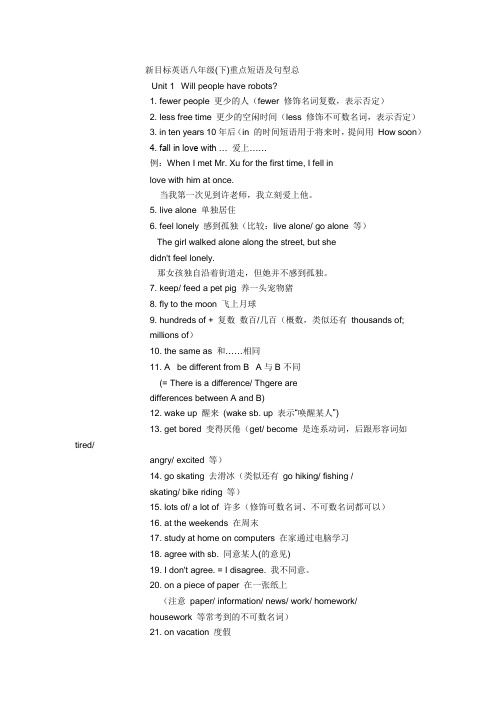
新目标英语八年级(下)重点短语及句型总Unit 1 Will people have robots?1. fewer people 更少的人(fewer 修饰名词复数,表示否定)2. less free time 更少的空闲时间(less 修饰不可数名词,表示否定)3. in ten years 10年后(in 的时间短语用于将来时,提问用How soon)4. fall in love with … 爱上……例:When I met Mr. Xu for the first time, I fell inlove with him at once.当我第一次见到许老师,我立刻爱上他。
5. live alone 单独居住6. feel lonely 感到孤独(比较:live alone/ go alone 等)The girl walked alone along the street, but shedidn't feel lonely.那女孩独自沿着街道走,但她并不感到孤独。
7. keep/ feed a pet pig 养一头宠物猪8. fly to the moon 飞上月球9. hundreds of + 复数数百/几百(概数,类似还有thousands of;millions of)10. the same as 和……相同11. A be different from B A与B不同(= There is a difference/ Thgere aredifferences between A and B)12. wake up 醒来(wake sb. up 表示“唤醒某人”)13. get bored 变得厌倦(get/ become 是连系动词,后跟形容词如tired/angry/ excited 等)14. go skating 去滑冰(类似还有go hiking/ fishing /skating/ bike riding 等)15. lots of/ a lot of 许多(修饰可数名词、不可数名词都可以)16. at the weekends 在周末17. study at home on computers 在家通过电脑学习18. agree with sb. 同意某人(的意见)19. I don't agree. = I disagree. 我不同意。
新目标人教版八年级英语下全册重点及练习
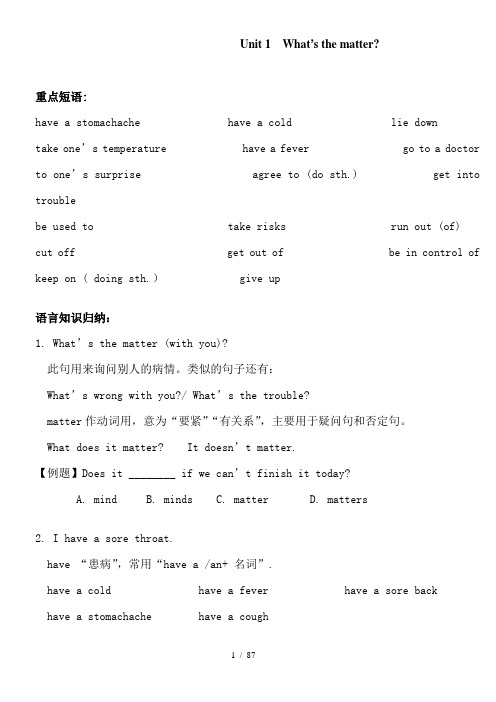
Unit 1 What’s the matter?重点短语:have a stomachache have a cold lie downtake one’s temperature have a fever go to a doctor to one’s surprise agree to (do sth.) get into troublebe used to take risks run out (of)cut off get out of be in control of keep on ( doing sth.) give up语言知识归纳:1. What’s the matter (with you)?此句用来询问别人的病情。
类似的句子还有:What’s wrong with you?/ What’s the trouble?matter作动词用,意为“要紧”“有关系”,主要用于疑问句和否定句。
What does it matter? It doesn’t matter.【例题】Does it ________ if we can’t finish it today?A. mindB. mindsC. matterD. matters2. I have a sore throat.have “患病”,常用“have a /an+ 名词”.have a cold have a fever have a sore back have a stomachache have a cough【例题】( )---Does he often have ______ cold? ---Yes. He also _____a cough and a sore throat.A. a; hasB. /; hasC. a; haveD. /; have3.Lie down and rest! 躺下休息lie down 躺下4.That’s probably why. 那可能就是原因。
- 1、下载文档前请自行甄别文档内容的完整性,平台不提供额外的编辑、内容补充、找答案等附加服务。
- 2、"仅部分预览"的文档,不可在线预览部分如存在完整性等问题,可反馈申请退款(可完整预览的文档不适用该条件!)。
- 3、如文档侵犯您的权益,请联系客服反馈,我们会尽快为您处理(人工客服工作时间:9:00-18:30)。
一、重点语法(一)一般将来时表示将要发生的动作或存在的状态,常与表将来的时间连用。
本时态标志词:1.含tomorrow; next week/month/year; in the future; in 2020;2.in+ 一段时间;3.how soon;4.祈使句句型中:or/and sb. will do5.在时间/条件状语从句中, 如果从句用一般现在时, 主句用将来时表示将来时的常见句式:1.用be doing表示将来:主要是表示按计划,安排即将发生的动作,常用于位置移动的动词;如come ,go, leave, arrive, fly, move, start, 等,也可以用其他动词。
I'm doing my homework tomorrow.2.be going to 表示近期、眼下就要发生的事情。
如:He is going to write a letter tonight.3.be going to 表示已有迹象表明即将发生的某种情况。
Look at the clouds. It's going to rain.4.在有条件从句的主句中,多用will, 如:例Be quick, or you will be late. = If you don’t be quick, you will be late.练习( ) 1. There __________ a meeting tomorrow afternoon.A. will be going toB. will going to beC. is going to beD. will go to be ( ) 2. Charlie ________ here next month.A. isn’t workingB. doesn’t workingC. isn’t going to workingD. won’t work( ) 3. He ________ very busy this week, he ________ free next week.A. will be; isB. is; isC. will be; will beD. is; will be( ) 4. There ________ a dolphin show in the zoo tomorrow evening.A. wasB. is going to haveC. will haveD. is going to be( ) 5. –_____ you ______ free tomorrow? –No. I _____ free the day after tomorrow.A. Are; going to; willB. Are; going to be; willC. Are; going to; will beD. Are; going to be; will be( ) 6. Mother ________ me a nice present on my next birthday.A. will givesB. will giveC. givesD. give( ) 7. – Shall I buy a cup of tea for you? –________. (不,不要。
)A. No, you won’t.B. No, you aren’t.C. No, please don’t.D. No, please.( ) 8. – Where is the morning paper? – I ________ it for you at once.A. getB. am gettingC. to getD. will get( ) 9. ________ a concert next Saturday?A. There will beB. Will there beC. There can beD. There are ( ) 10. If they come, we ________ a meeting.A. haveB. will haveC. hadD. would have(二)过去进行时结构:句型主语+ was/were +V-ing…否定句主语+ was/were+not +V-ing…一般疑问句was/were+主语+V-ing…过去进行时表示过去某一时刻或者某段时间正在进行或发生的动作,常和表过去的时间状语连用。
标志性词语:1.at that time/moment2.(at) this time yesterday(last night/sunday...)3.at +点钟+Yesterday(last night/ Sunday...)4.when , while 引导的时间状语从句例:She was doing her homework at 8:30 yesterday evening.昨天傍晚八点半她正在做家庭作业。
When I got up this morning, Mother was preparing breakfast in the kitchen.今天早上我起床时妈妈正在厨房里准备早餐。
练习1.My brother ___ while he ___ his bicycle and hurt himself.A. fell, was ridingB. fell, were ridingC. had fallen, rodeD. had fallen, was riding2. Tom ___ into the house when no one ___.A. slipped, was lookingB. had slipped, lookedC. slipped, had lookedD. was slipping, looked3.The last time I __ Jane she ___ cotton in the fields.A. had seen, was pickingB. saw, pickedC. had seen, pickedD. saw, was picking4.I don ' t think Jim saw me; he ___ into space.A. just staredB. was just staringC. has just staredD. had just stared5.I first met Lisa three years ago. She ___ at a radio shop at the time.A. has workedB. was workingC. had been workingD. had worked6.---Hey, look where you are going!---Oh, I ' m terribly sorry.________.A. I ' m not noticingB. I wasn ' t noticingC. I haven ' t noticedD. I don ' t notice7. The reporter said that the UFO ___ east to west when he saw it.A. was travelingB. traveledC. had been travelingD. was to travel8. I ___ my breakfast when the morning post came.A. hadB. had been havingC. have been havingD. was having9.When I arrived at his office, he ___ on the phone.A. was speakingB. spokeC. had been speakingD. had spoken10. “ What ' s the matter, Ali? You look sad. ”“ Oh, nothing much. As a matter of fact, I ___ of my friends back home. ”A. just thoughtB. have just been thinkingC. was just thinkingD. have just thought(三)If 的用法if 引导的条件状语从句。
If是连词,所连接的句子叫条件状语从句,表示假设或条件,意思是“ 如果……的话”,用法如下:表示假设,表示将会发生和可能发生的事,或进行提醒警告。
句子结构如下:If +句子(一般现在时),+主句(主语will/shall/may/can) +动词原形)(不能用be going to)a. If you finish your homework, you can go out and play.b. If I have enough money next year, I will go to travel.注意:宾语从句中的if与条件状语从句中的区别。
宾语从句中的if “是否”相当于whether,引导宾语从句,时态根据句意来确定。
I don't know if (是否)it will rain tomorrow.If(如果)it rains, I will stay at home.我不知道明天是否会下雨。
如果下雨,我将呆在家里在。
(四)现在完成进行时表示从过去某时开始一直持续到现在,有可能一直延续下去的动作。
常与for, since,how long,these days等表示一段时间的状语连用。
现在完成进行式结构:肯定句:主语+have / has +been+ doing/否定句:主语+have / has +not+been+ doing一般疑问句:Have / Has +主语+been+ doing/1.I have been writing the letter since then.从那时起我一直在写这封信。
(动作从过去一直持续到现在还在继续)2.I have been collecting stamps for ten years.自从10年前我就收集邮票了(动作从过去一直现在还在收集)。
3.How long have you been living here?你在这儿已经住了多长时间了。
